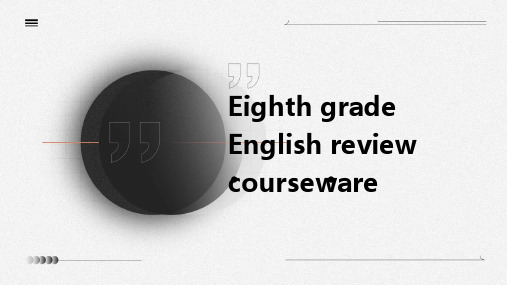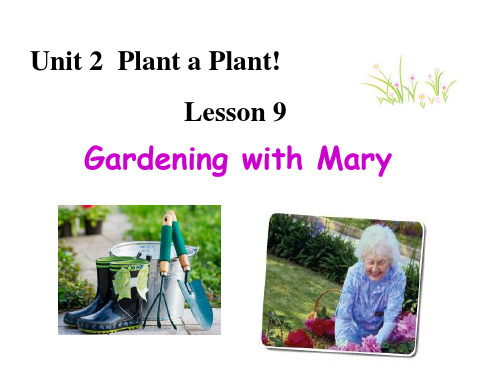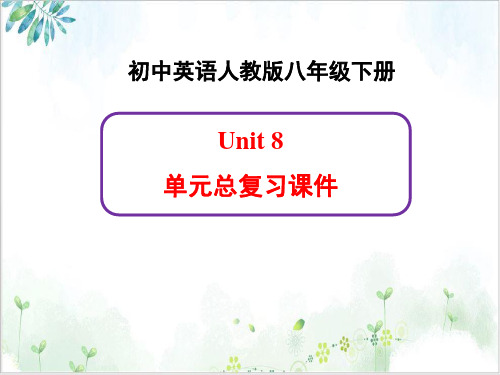八年级英语下专题复习课件
合集下载
八年级英语复习课件

Analyze the introduction to identify the main points and structure of the article
Body Paragraph Analysis
Examine the body paragraphs to identify the main ideas, supporting details, and transitions
Grammar Review
Mastering basic grammar rules
Systematically review the grammar knowledge of eighth grade English, including tense, voice, tone, sentence structure, etc. By analyzing example sentences, practicing, and simulating situations, help students proficiently master and apply grammar rules.
answer analysis
目录
01
Review goals and plans
Reviewing goals
Improving reading comprehension
By reading a variety of texts, students will increase their ability to understand and analyze written materials
03
Vocabulary and Word Means: Define or choose the best definition for a given word or phrase
冀教版八年级英语下册复习课件:Unit2PlantaPlant!—y(共19张PPT)

Task 4
Fill in the blanks and try to retell the text. Don’t miss “Gardening with Mary” o_n_ Saturday afternoons. Mary Green will _s_h_o_w_ you the best way to grow all kinds of plants. She has written many popular books about _g_a_r_d_e_n_in_g_. And now she has a TV show. Watch Mary at work in her own _g_a_r_d_e_n_. She will _p_l_a_n_t_ an apple tree. She will show you the best place to _g_r_o_w_ potatoes. _L_o_g__o_n_to_ our website and _p_o_s_t_ your question there. In every _s_h_o_w__, she will read the _p_o_s_t_s and answer your questions.
Phrases: log onto TV channel Patterns: have fun (in) doing sth. Thank you for your kindness. book v.预定
Some TV programs
Sitcom (情景喜剧)
soap opera
Some TV programs
Unit 2 Plant a Plant! Lesson 9
Gardening with Mary
【人教版】八年级下册Unit-总复习ppt课件

A. work B. working C. to work D. worked
3. (烟台)Life is ______ the unexpected. What ever we do, try
our best.
A. full of
B. proud of C. instead of D. because of
重点短语归纳
1. 出海_g_o_o_u_t_t_o sea go-went-gone 2. 充满了,装满了_b_e__fu_l_l o_f______=_b_e__fi_ll_e_d_w_i_th___ 3. 放下,记下__p_u_t_d_o_w_n___p_u_t-_p_u_t-_put 4. 到达岛上a_rr_iv_e__o_n_t_h_e_i_s_la_n到d 达_a_rr_iv_e__in_/_a_t _=_g_e_t _to__=r_e_a_ch 5. 快点_h_u_rr_y_u_p____________ 6. 两周后_in__tw__o_w__e_e_ks________ 7. 迫不及待做某事_c_a_n_'t_w__a_it_t_o_d_o__s_th_.__ 8. 许多人_a_n_u_m__b_e_r _o_f _p_e_o_p_le__ 人的数量_th_e__n_u_m_b_e_r_o_f_p_e_o_p_le 9. 猎杀动物为食_k_il_l a_n_i_m_a_l_s_f_o_r _fo_o_d___ 10.科学和技术_s_c_i_e_n_ce__a_n_d_t_e_c_h_n_o_lo_gy 11.预期做, 预定做_b_e__d_u_e____________ 12. 把...带回_b_r_in_g__.._.._.b_a_c_k__b_r_in_g_-_brought-brought 13. 遗留,留下,落后_l_e_a_v_e_b_e_h_in_d____le_a_v_e_-left-left
人教版英语八级下册单元总复习课件演示文稿(共65张PPT)

What do / does +人 + look like?用来提问人的外表。
句型大闯关
1.— What does Anna look like?
— _________.
A. She’s kind
B. She’s tall
C. She likes skating
3.Oliver Twist is about a boy who went out to sea and found an Island full of treasures.
A. by B. of C .for D. with
4. You should hurry up .
【解析】hurry up 赶快;急忙
(用在口语中,用来催促别人快走) in a hurry匆忙地
hurry to do sth 匆忙去做
hurry off 匆忙离开 You must hurry up, or you'll be late today. Why are you in such a hurry to leave?
science fiction 科幻小说
词汇训练营
9.科技;工艺 n. ____te_c_h_n_o_l_o_gy
10.法语 n. ____F_r_e_n_c_h
11.在国外;到国外 adv. ___ab__ro_a_d_
12.现代的;当代的 adj. ___m__o_d_e_r_n
13.成功 n. ___s_u_c_ce_s_s__
A. something
B. anything
C. nothing
D .everything
7.Who else is on my island?
句型大闯关
1.— What does Anna look like?
— _________.
A. She’s kind
B. She’s tall
C. She likes skating
3.Oliver Twist is about a boy who went out to sea and found an Island full of treasures.
A. by B. of C .for D. with
4. You should hurry up .
【解析】hurry up 赶快;急忙
(用在口语中,用来催促别人快走) in a hurry匆忙地
hurry to do sth 匆忙去做
hurry off 匆忙离开 You must hurry up, or you'll be late today. Why are you in such a hurry to leave?
science fiction 科幻小说
词汇训练营
9.科技;工艺 n. ____te_c_h_n_o_l_o_gy
10.法语 n. ____F_r_e_n_c_h
11.在国外;到国外 adv. ___ab__ro_a_d_
12.现代的;当代的 adj. ___m__o_d_e_r_n
13.成功 n. ___s_u_c_ce_s_s__
A. something
B. anything
C. nothing
D .everything
7.Who else is on my island?
2020-2021学年人教英语八年级下册unit3---Unit4复习课件

拓展 neither....nor.....意为“既不......也不……”,连接 主语时,谓语动词与nor后面的主语一致。
◆ Neither Jim nor I am interested in the song.
随堂演练
单项选择
(2016·湖南永州) Neither Li Hua nor I at writing.
7. The minute I sat down in front of the TV; my mom came over . 我刚刚坐到电视前面,我妈便走了过来。[教材P19 3a]
the minute= as soon as,意为“一……就……”,后 接从句。
◆ Please write to me the minute you get there.
◆We swept the house clean for New Year.
拓展
clean作动同用时,也有”打扫”的意思,但它的使用 范围要广泛,可指“(用扫帚)扫,(用抹布)洗、 抹”,而sweep通常指“(用扫帚)打扫”。
随堂演练
— Jack, how did you make the floor so dirty?
◆ He took out his book and began to read.
◆ There is too much rubbish here. Can you take it out?
拓展 take组成的短语还有:
take off脱下,起飞
take away拿走
take part in参加
take after(面貌、长相)像
people in it. ( 答案1.pass 2.passed )
Unit3 复习课件人教版八年级英语下册

22.依赖
depend on
23.做家务
do chores
24.把某物借给某人 lend sb. sth.= lend sth. to sb.
25.讨厌做某事
hate to do/ doing sth
26.散步 27.照顾
take a walk care for=look after=take care of
8.在外面待到很晚 stay out late
9.搭车 10.从事
get a ride work on
11.帮助解决
help out with sth.
12.闲逛
hang out
13.至少
at least
14.扔下
throw down
15.过来
come over
16.频繁,反复 all the time
拓展:其他表示委婉请求的常用句型
Would you like (to do) sth.? May I do sth.?/ Shall we do sth.? Would you mind (doing) sth.? What/ How about (doing) sth.?
1. -__C_____ you please help me find my key? -No problem.
C.It's a shame
D.I&hink two hours of TV is enough for you! *two hours of: 在从句中做主语,谓语动词用单数形式。
*当时间、长度、距离或其他可数名词表示 一个完整概念做主语,谓语动词用单数
委婉地请求别人许可: Could I do sth.? 肯定答语:Yes, you can./Sure./I guess so./Certainly / Sure, that should be OK. /Of course. 否定答语: Sorry, you can’t./ I’m afraid you can’t. (并说明理由)
新版全册八年级英语下册总复习课件(完整)
D. Good job
4.【辨一辨 考点突破】alone与lonely的用法辨析
adj. alone adv.
“独自的; 单独的”, 表示无人陪伴, 只陈述一 个客观事实, 不带感情色彩, 在句中作表语 “独自地; 单独地”, 用在实义动词后, 相当于 by oneself, 常在句中作方式状语 “孤独的”, 主观上感到“孤独的”, 感情色彩 浓厚, 强调心灵上的孤独与寂寞, 常在句中作 表语 “荒凉的; 偏僻的; 人迹罕至的”, 修饰表示地 点的名词, 只能作定语
【归纳拓展】有关up的短语
【练一练 走近中考】 (2014· 安徽中考)—We failed in the singing competition. —______. Better times are waiting for you.
A. No way
C. Cheer up
B. Best wishes
考点突破】difficult/difficultly/difficulty 的用法辨 “困难的”, 作定语、表语或宾语补 形容词 足语 副词 名词 “困难地”, 作状语
have difficulty (in) doing sth. 做某事 有困难
【 【填一填 思维激活】 ①I have__________ (difficult) reading at times. ②当你做决定有困难时, 可以打电话给我。 You can call me if you have __________ __________a decision. 答案: ①difficulty ②difficulty making 练一练 走近中考】 (2013· 聊城中考)—I have great ______in finishing the work by myself. Could you help me?
4.【辨一辨 考点突破】alone与lonely的用法辨析
adj. alone adv.
“独自的; 单独的”, 表示无人陪伴, 只陈述一 个客观事实, 不带感情色彩, 在句中作表语 “独自地; 单独地”, 用在实义动词后, 相当于 by oneself, 常在句中作方式状语 “孤独的”, 主观上感到“孤独的”, 感情色彩 浓厚, 强调心灵上的孤独与寂寞, 常在句中作 表语 “荒凉的; 偏僻的; 人迹罕至的”, 修饰表示地 点的名词, 只能作定语
【归纳拓展】有关up的短语
【练一练 走近中考】 (2014· 安徽中考)—We failed in the singing competition. —______. Better times are waiting for you.
A. No way
C. Cheer up
B. Best wishes
考点突破】difficult/difficultly/difficulty 的用法辨 “困难的”, 作定语、表语或宾语补 形容词 足语 副词 名词 “困难地”, 作状语
have difficulty (in) doing sth. 做某事 有困难
【 【填一填 思维激活】 ①I have__________ (difficult) reading at times. ②当你做决定有困难时, 可以打电话给我。 You can call me if you have __________ __________a decision. 答案: ①difficulty ②difficulty making 练一练 走近中考】 (2013· 聊城中考)—I have great ______in finishing the work by myself. Could you help me?
人教版八年级英语下册复习课件(一)
第 12 页
中考复习与训练英语 ·配人教版
30._s_e_t _u_p_____建立,设立 31._m__a_k_e_a_d_i_f_fe_r_e_n_c_e______影响,有作用 32._s_o_r_e_t_h_ro_a_t______嗓子疼 33._a_g_r_e_e_t_o_s_th_._______同意某事 34._s_a_v_e_o_n_e_'s__li_f_e_______拯救某人的生命 35._s_e_e_a__d_e_n_ti_st_______看牙医 36._m__o_u_n_ta_i_n_c_l_im__b_in_g______爬山,登山 37._d_i_ff_i_cu_l_t_s_it_u_a_ti_o_n_________困境 38._m__a_k_e_d_e_c_is_i_o_n_s/_a_d_e_c_i_si_o_n________做决定 39._s_t_u_d_y_p_r_o_g_ra_m______学习项目
第 13 页
中考复习与训练英语 ·配人教版
40._o_l_d_p_e_o_p_l_e_'s_h_o_m__e______养老院 41._p_u_t_u_p_____搭起;举起 42._h_e_l_p_o_u_t_____帮助解决困难 43._r_e_a_d_in_g__p_ro_g_r_a_m______阅读项目 44._r_a_is_e__m_o_n_e_y_____筹钱 45._a_n_s_w_e_r_t_h_e_p_h_o_n_e______接电话 46._b_e__e_x_ci_t_ed__a_b_o_u_t______对……感到兴奋
第 10 页
中考复e_t _in_t_o_____陷入;参与 11.__b_e_u_s_e_d__to__d_o_in_g______习惯于做……;适应于做…… 12.__ta_k_e__ri_s_k_s/_t_ak_e__a_r_is_k_________冒险 13.__r_u_n_o_u_t_(_o_f)______用尽,耗尽 14.__c_u_t _o_ff_____切除 15.__g_e_t _o_u_t _o_f_____离开,从……出来 16.__b_e_i_n_c_o_n_t_ro_l_o_f_______掌管,管理 17.__g_iv_e__u_p____放弃 18.__c_le_a_n__u_p____打扫(或清除)干净 19.__c_h_e_e_r _u_p____(使)变得高兴,振奋起来
中考复习与训练英语 ·配人教版
30._s_e_t _u_p_____建立,设立 31._m__a_k_e_a_d_i_f_fe_r_e_n_c_e______影响,有作用 32._s_o_r_e_t_h_ro_a_t______嗓子疼 33._a_g_r_e_e_t_o_s_th_._______同意某事 34._s_a_v_e_o_n_e_'s__li_f_e_______拯救某人的生命 35._s_e_e_a__d_e_n_ti_st_______看牙医 36._m__o_u_n_ta_i_n_c_l_im__b_in_g______爬山,登山 37._d_i_ff_i_cu_l_t_s_it_u_a_ti_o_n_________困境 38._m__a_k_e_d_e_c_is_i_o_n_s/_a_d_e_c_i_si_o_n________做决定 39._s_t_u_d_y_p_r_o_g_ra_m______学习项目
第 13 页
中考复习与训练英语 ·配人教版
40._o_l_d_p_e_o_p_l_e_'s_h_o_m__e______养老院 41._p_u_t_u_p_____搭起;举起 42._h_e_l_p_o_u_t_____帮助解决困难 43._r_e_a_d_in_g__p_ro_g_r_a_m______阅读项目 44._r_a_is_e__m_o_n_e_y_____筹钱 45._a_n_s_w_e_r_t_h_e_p_h_o_n_e______接电话 46._b_e__e_x_ci_t_ed__a_b_o_u_t______对……感到兴奋
第 10 页
中考复e_t _in_t_o_____陷入;参与 11.__b_e_u_s_e_d__to__d_o_in_g______习惯于做……;适应于做…… 12.__ta_k_e__ri_s_k_s/_t_ak_e__a_r_is_k_________冒险 13.__r_u_n_o_u_t_(_o_f)______用尽,耗尽 14.__c_u_t _o_ff_____切除 15.__g_e_t _o_u_t _o_f_____离开,从……出来 16.__b_e_i_n_c_o_n_t_ro_l_o_f_______掌管,管理 17.__g_iv_e__u_p____放弃 18.__c_le_a_n__u_p____打扫(或清除)干净 19.__c_h_e_e_r _u_p____(使)变得高兴,振奋起来
牛津译林版英语八年级下册Unit8Agreenworld复习课件(27张PPT)
(good) place. 9.Coal, oil and _n_a_t_u_r_a_l _ (nature) gas are not endless. 10.Millie does the homework so _c_a_r_e_le_s_s_ly (care) that she
often makes mistakes.
Things like glass, plastic and paper are separated and then recycled.
2. Why does the government make laws?
They make laws to protect the environment.
3. What is our greatest treasure?
8.我们的环境正在变得更糟。 9.循环利用也是帮助减少污染的好办法。
1.例如,我们不被允许砍树。
We are not allowed to cut down trees.
2.如果我们在公共场所丢垃圾,,我们将被警察罚款。
If we drop litter in a public place,we will be
■harmful adj.有害的 反义词:harmless 无害的
10.produce v. 生产,制造
product n. 产品 producer n.生产者
e.g. More cars_w__i_ll__b_e__p__r_o_d__u_c_e_d___(produce) in the
future.
go to the supermarket. 4.allow v.允许
■allow sb. to do sth.-改--被---动-→ sb. be allowed to do sth.
often makes mistakes.
Things like glass, plastic and paper are separated and then recycled.
2. Why does the government make laws?
They make laws to protect the environment.
3. What is our greatest treasure?
8.我们的环境正在变得更糟。 9.循环利用也是帮助减少污染的好办法。
1.例如,我们不被允许砍树。
We are not allowed to cut down trees.
2.如果我们在公共场所丢垃圾,,我们将被警察罚款。
If we drop litter in a public place,we will be
■harmful adj.有害的 反义词:harmless 无害的
10.produce v. 生产,制造
product n. 产品 producer n.生产者
e.g. More cars_w__i_ll__b_e__p__r_o_d__u_c_e_d___(produce) in the
future.
go to the supermarket. 4.allow v.允许
■allow sb. to do sth.-改--被---动-→ sb. be allowed to do sth.
人教版初中英语八年级下册[Units 5—6] 中考英语复习 教学PPT课件
I'm not a bit tired.=I'm not tired at all. 第11课时 八年级下册 [Units 5—6]
我一点儿也不累。 I'm not a little tired.=I'm very tired.我非常累。 (2)a little 和a bit of可以作定语,修饰名词,两者 只能修饰不可数名词。 There's only a little/a bit of food left for lunch. 午餐只剩一点儿食物了。
第11课时 八年级下册 [Units 5—6]
┃基础精梳理 ┃
类别
中考考点助记
词语 联想
1.(1)名词变复数: match→_m_a_t_c_h_e_s_, wife→__w_i_v_e_s__ (2)名词变形容词: silence→_s_i_l_e_n_t__, ice→__i_c_y____, west→_w_e_s_t_e_r_n_, truth→__t_r_u_e___ 2.反义词: against→_f_o_r_____, rise→___f_a_l_l__ 3.形容词变副词: heavy →_h_e_a_v_i_l_y_, complete→_c_o_m_p_l_e_t_e_l_y__, recent→___r__e_c_e_n_t_l_y___, sudden→___s_u_d_d_e_n_l__y___________
midnight.
第11课时 八年级下册 [Units 5—6]
重点 句型
8.妻子告诉她丈夫,除非他把孩子们留在森林里死掉,否则全家
人都将会死掉。 The wife told her husband that unless he__l_e_f_t____ _t_h_e_____ _c_h_i_l_d_r_e_n___t_o____ ___d_i_e___ in the forest, the whole family would
我一点儿也不累。 I'm not a little tired.=I'm very tired.我非常累。 (2)a little 和a bit of可以作定语,修饰名词,两者 只能修饰不可数名词。 There's only a little/a bit of food left for lunch. 午餐只剩一点儿食物了。
第11课时 八年级下册 [Units 5—6]
┃基础精梳理 ┃
类别
中考考点助记
词语 联想
1.(1)名词变复数: match→_m_a_t_c_h_e_s_, wife→__w_i_v_e_s__ (2)名词变形容词: silence→_s_i_l_e_n_t__, ice→__i_c_y____, west→_w_e_s_t_e_r_n_, truth→__t_r_u_e___ 2.反义词: against→_f_o_r_____, rise→___f_a_l_l__ 3.形容词变副词: heavy →_h_e_a_v_i_l_y_, complete→_c_o_m_p_l_e_t_e_l_y__, recent→___r__e_c_e_n_t_l_y___, sudden→___s_u_d_d_e_n_l__y___________
midnight.
第11课时 八年级下册 [Units 5—6]
重点 句型
8.妻子告诉她丈夫,除非他把孩子们留在森林里死掉,否则全家
人都将会死掉。 The wife told her husband that unless he__l_e_f_t____ _t_h_e_____ _c_h_i_l_d_r_e_n___t_o____ ___d_i_e___ in the forest, the whole family would
- 1、下载文档前请自行甄别文档内容的完整性,平台不提供额外的编辑、内容补充、找答案等附加服务。
- 2、"仅部分预览"的文档,不可在线预览部分如存在完整性等问题,可反馈申请退款(可完整预览的文档不适用该条件!)。
- 3、如文档侵犯您的权益,请联系客服反馈,我们会尽快为您处理(人工客服工作时间:9:00-18:30)。
初二英语(下)
14. 15. 16. 17. 18. 19. 21. 22. 23. 24. 25. 26. 27. 28.
make faces teach oneself fall off play the piano knock at to one's surprise look up enjoy oneself help yourself tell a story / stories leave....behind …… come along hold a sports meeting be neck and neck as ... as
43. 44. 45. 46. 47. 48. 49. 50. 51. 52. 53.
hurry off come to oneself after a while knock on take care of at the moment set off here and there on watch look out take one’s place
6. take part in/join take part in参加某种活动; join参加,加入某一政党 或组织。例如: Can you take part in my party. 你能来参加我的派对吗? We often take part in many school activities. 我们经常参加学校里的一些活动。 He joined the party in 1963. 他1963年入的党。 My little brother joined the army last year. 我小弟去年参的军。
III. 交际用语 1. We’re all by ourselves. 2. I fell a little afraid. 3. Don’t be afraid. 4. Help! 5. Can’t you hear anything? 6. I can’t hear anything / anybody there. 7. Maybe it’s a tiger. 8. Let’s get it back before they eat the food. 9. Did she learn all by herself? 10. Could she swim when she was …years old? 11. She didn’t hurt herself. 12. He couldn’t buy himself many nice things. 13. Did he enjoy himself? 14. Help yourselves. 15. Bad luck!
【知识梳理】 I. 重点短语 1. on time 2. out of 3. all by oneself 4. lots of 5. no longer 6. get back 7. sooner or later 8. run away 9. eat up 10. take care of 11. turn off 12. turn on 13. after a while
【考点扫描】 中考考点在本单元主要集中在: 1. 不定代词/副词的运用; 2. 反身代词的用法; 3. 并列句; 4. 形容词和副词的比较等级; 5. 冠词的用法; 6. 动词的过去进行时; 7. 本册书学过的词汇、短语和句型; 8. 本册书学过的日常交际用语。 考试形式可以是单项填空、完型填空、短文填空 和完成句子。
5. either/ neither/ both either可作形容词,一般指"两者中的任何一个"。有时 也可表示"两个都……"的意思,后跟名词的单数形式; neither: 指两者中没有一个,全否定;both: 指两者都,肯 定。句中可作主语、宾语和定语,both后面应跟名词的复 数形式。如: Neither of the films is good. 两部电影都不好。(没有一部是好的) Either of the films is good. 两部电影都不错。(谓语动词用单数) Both the teachers often answer the questions. 这两个老师都常常解答问题。
4. many/ much/ a few/ a little/ few/ little (1)many修饰可数名词,much修饰不可数名词;都表示许多。例如: He has many books. 他有许多书。 He drank much milk. 他喝了许多牛奶。 (2)a few和a little都表示"有一点儿",侧重于肯定,相当于"some",但 a few修 饰可数名词,a little修饰不可数名词,例如: He has a few friends in London. 他在伦敦有一些朊友。 Would you like some coffee? Yes, just a little. 喝点咖啡好吗?好的,只要一点。 (3)few和little表示"几乎没有",侧重否定。few后接可数名词,little后 接不可数名词。例如: He is a strange man. He has few words. 他是个怪人,他几乎不说什么话。 Hurry up, there is little time left. 赶快,没什么时间了。
29. 30. 31. 32. 33. 34. 35. 36. 37. 38. 39. 40. 41. 42.
not so / as ... as do one's best take part in a moment late Bad luck! fall behind high jump long jump relay race well done! take off as usual a pair of at once
7. quite/ rather/ very (1)quite 表示程度“很,十分,完全地”,“相当”。如: She is quite right.她对极了。 That's not quite what I want . 那并不完全是我所要的。 (2)rather 表示程度上的“相当”,比预想地程度要大,通 常用在不喜欢的情况下。如:It's rather cold today.今天的 天气相当冷。 (3)very表示程度“很,甚,极其,非常”,用于修饰形容词 或副词,既可用在喜欢的情况下,也可用于不喜欢的情况 下。应注意“a very +形容词+可数名词的单数”结构中,"a" 应置于"very"之前,该结构相当“quite a/an +形容词+名词 ”的结构。如: Two months is quite a long time. / a very long time. 两个 月是一段很长的时间。 It's a very nice day / quite a nice day. 今天天气很好。
2. somebody/ anybody/nobody 一般说来,somebody用于定句,anybody用于否定句、疑问 句和条件状语从句。例如: Somebody came to see you when you were out. 你出来时有人来见你。 Does anybody live on this island? 有人在这岛上住吗? I didn't see anybody there. 我在那儿谁也没看见。 Don't let anybody in. I'm too busy to see anybody. 别让任何人进来。我太忙,谁也不想见。 There is nobody in the room. 房间里没人。 Nobody told me that you were ill, so I didn't know about it . 谁也没告诉我你病了。所以我不知道。
3. listen, listen to, hear 这三个词意思都是“听”,但是它们的用法不完全相同。它们的区 别在于: (1)listen 只用于不及物动词,后面接人或人物做宾语,着重于“倾 听”,指的是有意识的动作,至于是否听到,并非强调的重点。如: Listen! Someone is singing in the classroom. 听!有人在教室唱歌。 (2)listen to 为listen的及物形式,后面一定要接人或物做宾语,这 里的to是介词。如: Do you like listening to light music? 你喜欢听轻音乐吗? (3)hear 可用作及物动词,也可用作不及物动词,意思是“听到、听 见”,指用耳朵听到了某个声音,表示无意识的动作,着重于听的能 力和结果。如: We hear with our ears. 我们用耳朵听。 She listens but hears nothing. 她听了听,但是什么也没有听见。
IV. 重要语法 1. 不定代词/副词的运用; 2. 反身代词的用法; 3. 并列句; 4. 形容词和副词的比较等级; 5. 冠词的用法; 6. 动词的过去进行时; 【名师讲解】 1. bring/take Bring表示“带来、拿来”,指从别处朝说话人所在或将在的 地方“带来、拿来”。而take则表示“拿去、带走”,它表示的 方向与bring相反,指从说话人所在地“拿走、带走”。如: Bring me the book, please. 把那本书给我拿来。 Take some food to the old man. 给那位老人带去些食物。
16. 17. 18. 19. 20. 21. 22. 23. 24. 25. 26. 27. 28. 29. 30. 31. 32. 33.
Come on! Well done! Congratulations (to …)! It must be very interesting. I don’t think you’ll like it. It seems to be an interesting book. I’m sure (that)… I’m not sure if… I’m not sure what to… I hope so. What was he/she drawing when …? I’m sorry to trouble you. Would you please…? What were you doing at ten o ’clock yesterday morning? You look tired today. You’d better go to bed early tonight, if you can. How kind! Let’s move the bag, or it may cause an accident. It’s really nice of you. Don’t mention it. Don’t crowd around him.
